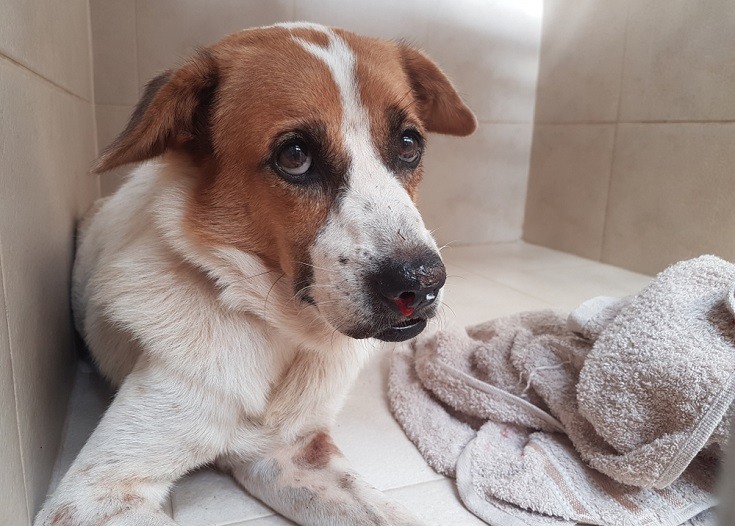Can Dogs Get Concussions? What to Watch Out For (Vet Answer)

Updated on
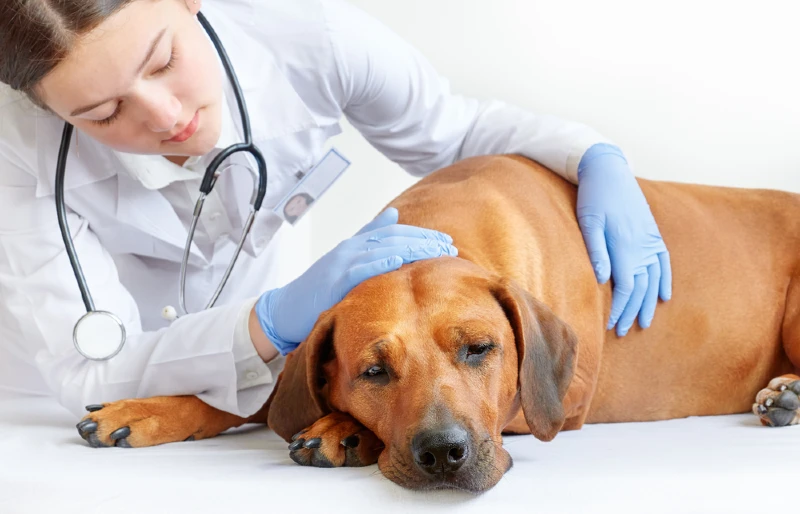
Click to Skip Ahead
We’ve all been there: running around until someone gets hurt. What do you do if your pup can’t tell you if something hurts? Can your dog even get a concussion? A concussion is a traumatic brain injury that can have lasting complications. They typically occur with an injury to the head, but rapid shaking can also cause them. And yes, dogs can get concussions.
Read on to learn more!
Can Dogs Get Concussions?
Dogs can get concussions, but diagnosing them in your furry friend can be more challenging because they can’t tell you what’s wrong. You might have seen your dog fall or get hit by a baseball, or your Chihuahua may have been stepped on or shaken by a Great Dane.
Blunt injuries cause most concussions, but some common causes include:
- Being hit by a vehicle
- Rough housing with dogs
- Falling
- Getting hit with a hard object
- Being picked up and shaken by a larger dog
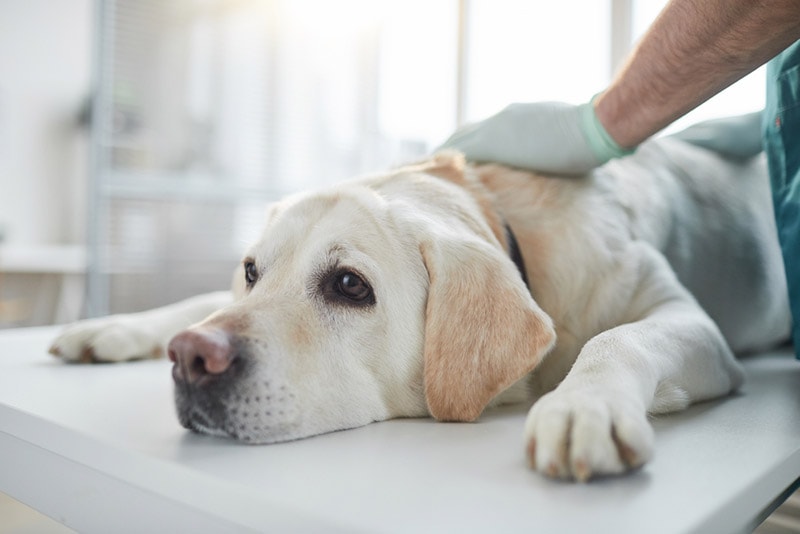
Signs of a Concussion in Your Dog
You can’t ask your dog questions to see if they might be concussed, but you can check if they’re responding to you like they usually would. A delayed response or your dog’s confusion are red flags that they could have a brain injury. Here are some other signs to be aware of:
- Acting nauseated or actively vomit
- Heavy drooling or lip-smacking
- Trouble walking in a coordinated manner, even falling over
- A tilted head
- Pupils of the eyes are uneven in size
- Rapid eye movement
If your dog loses consciousness, take them to the animal emergency hospital. You should take them in for an evaluation even if they’re unresponsive briefly.
What to Do if You Suspect Your Dog Has a Concussion
If your dog has potentially had head trauma or had any evidence of a concussion, you must have them evaluated by a veterinarian immediately. Do your best to stop whatever they were doing when it happened and keep them as calm as possible.
It’s helpful to alert your veterinarian to expect you by giving them a quick phone call. Doing so will also help because your veterinarian may need to direct you to an emergency facility if they cannot help you.
For transportation, one veterinary recommendation is to keep your dog’s head at a 30-degree angle. Support the neck with a pillow or blanket doubled over to reduce pressure on the brain and help stabilize the neck.
Because of the potential for injuries in the head, neck, back, and other areas, you’ll want to avoid as much manipulation as possible. A stretcher can be helpful if you have another person to help you move your pup.
While keeping your dog on a leash is generally recommended, you need to avoid pressure around the neck after a possible concussion, as doing so can increase the pressure within the brain. A harness is best if you can get it on your dog safely.
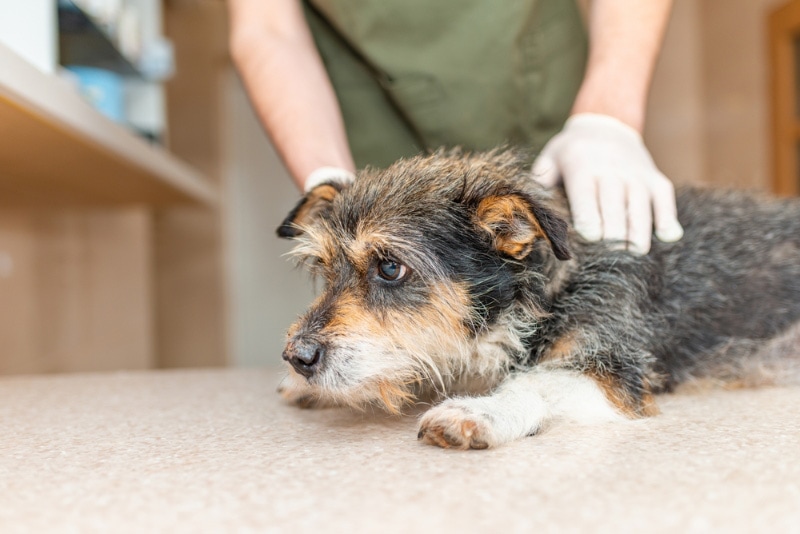
Treatment for a Dog’s Concussion
Treatment depends on many things, from what happened to your dog and the signs they’re showing to what diagnostics show.
First off, your veterinarian will perform a thorough physical exam. They need to check your dog’s vitals, such as heart rate and capillary refill time, to assess for problems like shock. Your veterinarian should perform a neurologic exam as well. They will check a variety of reflexes and responses, including the following:
- Pupillary light reflex
- Menace response
- Proprioception
- Patellar reflex
Abnormalities in these responses can help direct your veterinarian to where the traumatic injury could have affected your dog.
Your veterinarian may recommend diagnostic testing, including blood work and imaging. While X-rays may not tell us everything, they can help pinpoint if any vertebrae are out of alignment. Sometimes, your vet will recommend a CT scan or MRI for more precise imaging.
Your veterinarian may recommend observing your dog for a time, which could be hours or even a couple of days. Having them under veterinary supervision allows your dog’s doctor to intervene quickly if anything changes with your dog’s status. If they send your pup home, keep a close eye on them and keep them quiet and calm while they recover.
Much of the treatment for a concussion in your dog will be supportive therapy. If your dog is acting nauseous or has vomited, your veterinarian will generally prescribe anti-nausea medications. The advantage of maropitant, known by the brand name Cerenia, is that it can also help with vestibular issues and dizziness as a supportive therapy.
Dogs with altered blood pressure or signs of dehydration may need fluid therapy. Your veterinarian may utilize steroids to decrease inflammation or pain medication for injuries to keep your pooch comfortable.
The good news is that dog concussions usually don’t cause lasting damage to or problems for your furry friend.
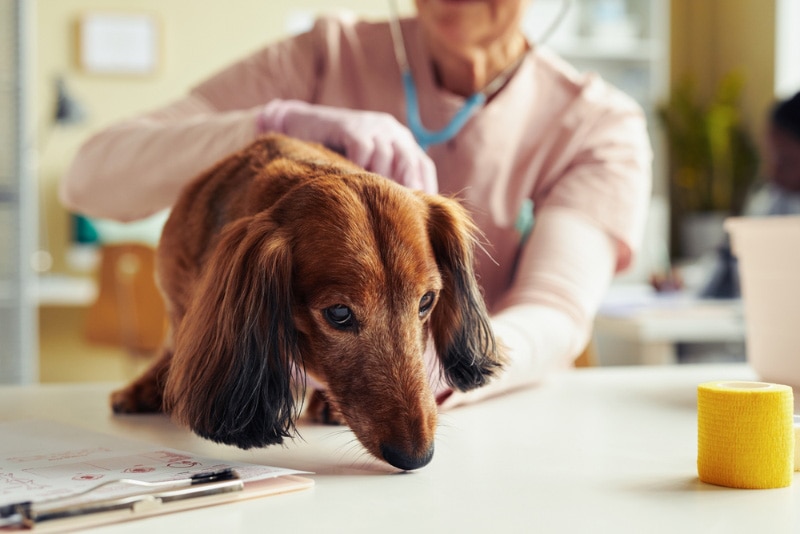
Preventing Concussions in Your Dog
The best way to help your dog is to prevent concussions from ever occurring. To do this, you’ll need to analyze some risk factors. If you have a little dog that likes to pick fights and could be in danger of injury from a larger dog, keep them separated and work with a trainer to minimize the chance of issues.
Keep your dog on a leash or secured within a fenced yard under supervision when they’re outside to help reduce the possibility of getting out in the road and being hit by a car.
Keep your dog safely away from high locations where they could fall and get a concussion, which could mean limiting access to a balcony or keeping your dog away from a cliff’s edge on a hike.
Frequently Asked Questions (FAQs)
How long does it take for concussion signs to appear in dogs?
It can take days for your dog to show signs of a concussion, but it usually takes a few hours. Signs such as incoordination can take time to develop. There’s also the fact that if your dog was playing or rough housing before the injury, it takes time for the adrenaline to wear off.
If you suspect your dog has sustained a head injury, getting them evaluated by a veterinarian quickly can help mitigate signs of issues.
How does a dog act after a concussion?
It can be hard to determine if your dog has a concussion since they can’t talk to us like a person and let us know what hurts. They already can’t respond to typical questions you would get asked in the hospital, such as, “What day is it?” or “Who is the president?”.
You might notice some changes in your dog’s movement or behavior. They might be uncoordinated. They could have a delayed response to you or other stimuli. Your dog might also seem weak or lethargic.
Any change in your dog’s behavior should be evaluated by a veterinarian, particularly after a possible head injury.

Conclusion
Dogs can get concussions, but it can be challenging to diagnose the head injury. If your dog has a traumatic injury, your veterinarian should examine the dog to ensure they’re okay. Observation is critical, so even if your vet clears your dog, keep a close eye on them in the following days and contact your veterinarian if anything seems out of the ordinary.
Featured Image Credit: Zontica, Shutterstock





